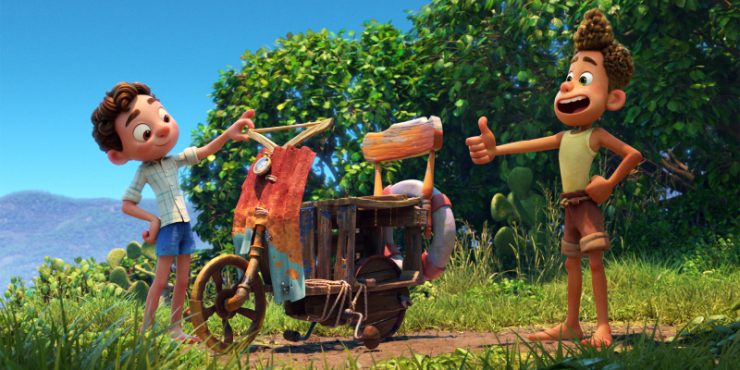Pixar Animation, and Disney at large, has become a bit of a geographical rover, finding areas of the world that its studio has yet to recreate with uncanny accuracy. (Before Soul, was there ever a more lifelike animation of New York City? Nearly unsettling, if not impressive.) Luca takes us to the quaint fishing villages of coastal Italy, in the fictional town of Portorosso. In the sunshine, the residents of Portorosso simply fish, eat pasta, ride bicycles and exist. Their courtyards are scurried with playful children eating gelato in the Summer sun. It’s an idyllic existence, except for the sea monsters who terrorize the fishermen as they attempt to collect their livelihood. As their sole nemesis, the entire town has conspired to kill any sea monster on sight.
For the sea monsters themselves, life underwater is just as treacherous. The constant threat of being harpooned by humans (or “land monsters”) leaves them in a state of persistent fear. This is particularly tough for Luca (Jacob Tremblay), a young sea monster with a healthy curiosity for what’s above. Luca’s mother (Maya Rudolph) demands that Luca never stray far from their home, while his father (Jim Gaffigan) seems more interested in his prize-winning crab collection than his son’s whereabouts. Only his grandmother (Sandy Martin) is willing to suggest that Luca is ready to explore on his own, but her say has little influence over his mother’s reign. Things change when Luca meets Alberto (Jack Dylan Grazer), and learns something that will transform his entire life.
Alberto is another young sea monster, a rambunctious castoff, living alone and collecting artifacts from the human world. He can also fully transform into a human boy when on dry land. It isn’t until he sees Alberto that Luca realizes that all sea monsters possess this magical ability, including him. Alberto invites him into the exciting world of life on land, where they can build bikes only to crash them, climb towers only to jump off of them, but most of all they can dream of one day owning their ideal vehicle: a Vespa. When Luca’s mother threatens to send him into the deep ocean to stay with his grotesque uncle (a funny, scene-stealing five-minute voice performance from Sacha Baron Cohen), Luca and Alberto hatch a plan to hide as boys in Portorosso, hoping to acquire their beloved Vespa and flee this town for good.
Life on land has a learning curve. A simple rain shower can turn them back into their usual form and put them at the mercy of the town’s many sea monster killers. They learn about a triathlon (cycling, swimming, eating pasta) that could earn them the prize money needed to buy their Vespa, and decide to train for it with Giulia (Emma Berman), another scrappy youth whose annual dream of winning the triathlon is always foiled by the cocky and cruel Ercole Visconti (Saverio Raimondo), who’s going for his third straight win. The boys stay in Giulia’s home with her burly but sensitive father, Massimo (Marco Barricelli), a fisherman with his own particular bloodlust for sea monsters. As they train, Luca learns even more about the world than he did before, astonished at the seemingly endless amounts of information there can be about a place he thought he once knew.
Hijinks ensue as Luca’s parents also come to Portorosso and try to find Luca amongst the rowdy children. Tension rises between Luca and Alberto, as Luca’s ambitions as a human boy become more than what the fun-loving Alberto has to offer. Characters in Luca are made to confront prejudices, sea monster-related or otherwise, and some succeed in adapting while others are set in their ways. Its dissections are shallow and its romanticism is, perhaps, naive. Like most children’s movies (especially the ones released by Disney), it does not delve too deep into the more unpleasant side of human nature. But it is impressive in its balance between of eye-popping visuals and sincere lesson-learning.
This is a film about self-discovery and acceptance. About empathy for those who are not like you, and understanding of your fellow man’s plight. In other words, nothing too out of the ordinary for an animated film. Luca‘s plot is light and unintrusive. Its simplicity plays into its pastel-colored cheerfulness. Story details and character backstory are mostly shuttered away in loo of sequences of prepubescent boisterousness. It’s a wondrous film to watch, on par with the standard of quality in every other Pixar production, but also particularly handsome in its recreation of Summertime escapades. It’s more anti-realist than other recent Pixar releases, more willing to concede to being “cartoonish”. You can question a number of things (particular physical details regarding just how much water turns them back into monsters and just how quickly; also how does the whole breathing thing work?), but you can’t question Luca‘s commitment to recreating the spectacle of childhood adventure.
Directed by Enrico Casarosa










